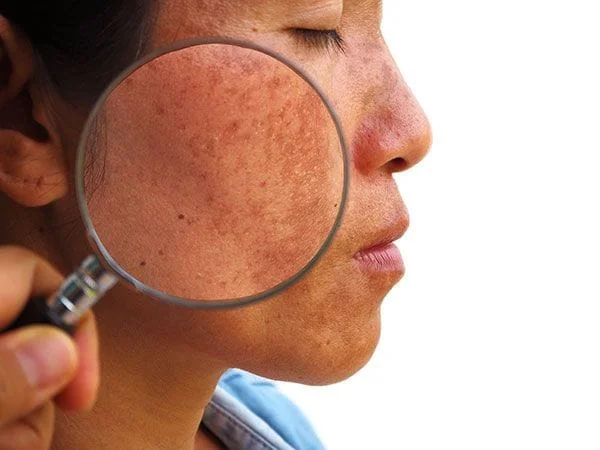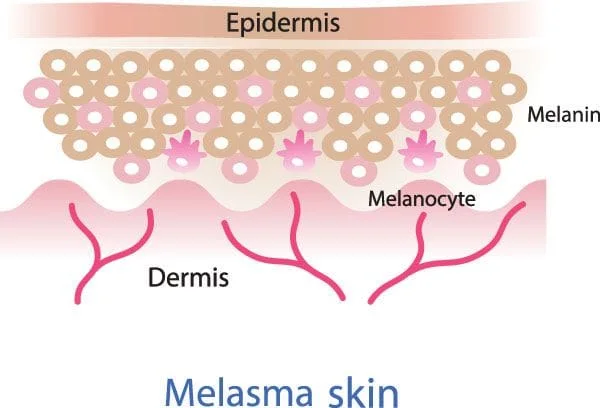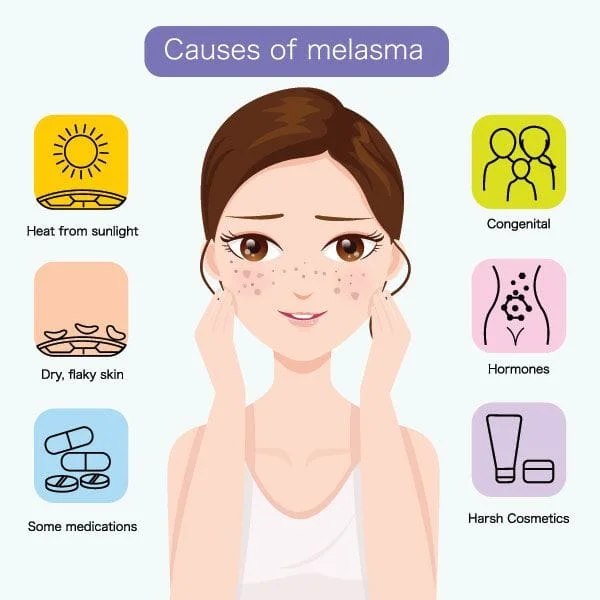

What is Melasma?
Melasma is a common pigmentation disorder that causes brown or gray patches to appear on the skin, primarily on the face. Typically these lesions are large.
The most common areas that melasma affects include:
- The bridge of the nose
- The forehead, and
- Cheeks
What causes Melasma?
Melasma appears when pigment-producing cells become hyperactive and produce too much pigment in certain areas of the skin. The mechanism is similar to what causes freckles.
What exactly causes pigment-producing cells to become hyperactive is unclear; however, common triggers seem to include:
- Sun exposure: Melasma can be caused or worsened by BOTH the sun's rays AND heat and visible light produced by the sun. This means that you need a sunscreen that blocks not only the sun's rays, but also its light and heat. There are two main types of sunscreens:
- Sunscreens that use chemicals, such as oxybenzone, avobenzone, octisalate, octocrylene, homosalate, or octinoxate, and
- Sunscreens that use mineral or physical blockers, such as zinc and titanium dioxide.
- You want to choose a non-chemical blocking sunscreen, so a mineral or physical blocker. Mineral or physical blocking sunscreens will stop light and different wavelengths from damaging your skin. Chemical sunscreens don't offer the same protection for melasma as physical blockers do.
- Even in the fall and winter months it's also a good idea to wear a hat for added protection.
- Pregnancy: Melasma is sometimes referred to as the “mask of pregnancy”, because it’s sometimes triggered by an increase in hormones in pregnant women. Fluctuations in hormone levels both during and after pregnancy can trigger melasma.
- Birth control pills and hormone replacement therapy: Melasma may occur as a result of hormonal fluctuations associated with starting or stopping birth control pills, or taking hormone replacement therapy.
- Certain cosmetics may cause a pigmented dermatitis contributing to melasma
- Environmental pollution can also contribute to melasma. Airborne pollutants can bind to the skin and corrode its protective surface, making your skin weaker and more susceptible to sun damage.
What are the Risk Factors for developing Melasma?
- You're more likely to get melasma if you have a darker skin type, likely because your skin naturally has more active pigment-producing cells.
- Melasma is more common in women compared with men.
- It often runs in families, so genetics and family history may play a role.
- Pregnancy or recent childbirth is a risk factor
- Use of certain cosmetics may increase your risk
- Sun exposure may also increase your risk
How is Melasma Treated?
- The first step in treating melasma is confirming with a dermatologist that your darkened skin patches are actually melasma. Identifying the cause (or causes) of your skin changes is essential to the success of your treatment, as treatment will likely be ineffective if the underlying cause is not addressed and triggers are not avoided. Be sure to avoid any known triggers such as sun exposure or certain cosmetics.
- Melasma during pregnancy may go away a few months after delivery. Treatment is not always necessary, though this is not always the case. Many women WILL require treatment.
- Following a strict sunscreen regimen is crucial! Get serious about using sunscreen regularly and habitually during all seasons of the year.
- While melasma isn't painful and doesn't present any health risks itself, it can cause significant emotional distress and make some women feel self-conscious. There are several treatment options that may improve the appearance of your melasma. We’re here to help you identify what options might best meet your individual needs so that you can feel good about you and lead your best life possible.
- Topical treatments may be prescribed by dermatologists to help lighten melasma.
- Other treatments that might be recommended include chemical peels, laser treatments, and skin microneedling all of which we perform at our Advanced Medical Spa and Laser Center.
